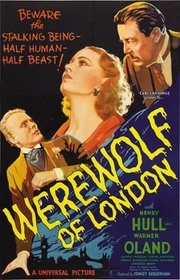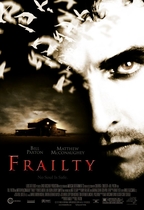Our editor-in-chief Nate Yapp is proud to have contributed to the new book Hidden Horror: A Celebration of 101 Underrated and Overlooked Fright Flicks, edited by Aaron Christensen. Another contributors include Anthony Timpone, B.J. Colangelo, Dave Alexander, Classic-Horror.com's own Robert C. Ring and John W. Bowen. Pick up a copy today from Amazon.com!
Werewolf of London (1935)
Though not the grand spectacle of horror that the later Wolf Man would be, The Werewolf of London still stands out as a fine effort from Universal. Then again, what 1930s Universal chiller doesn't qualify as a classic?
World-renowned botanist Dr. Wilfred Glendon (Henry Hull) has a bit of a problem. Y'see, while searching for a rare plant in the Tibetan mountains (which look suspiciously like they're in California), he gets bitten by a werewolf. Back in London, the mysterious Dr. Yogami (Warner Oland) warns Glendon in a roundabout way that at the first beams of the full moon, he will turn to a werewolf, and kill the thing he loves most, in this case Glendon's wife Lisa (Valerie Hobson, Bride of Frankenstein). The only antidote known for this particular brand of lycanthropy are the flowers from a rare plant found in the Tibetan mountains, a sample of which Glendon brought back from his journey. However, when the full moon strikes, the plant's flowers go missing, and he begins a nightmarish cycle of wolfishness.
The werewolf mythos later set down in The Wolf Man isn't quite evident here. There's no mention of silver, no nifty poem. The lycanthrope here is a little more intelligent, able to work complicated machinery and put on his hat and coat before going out to slaughter. Furthermore, everything takes place in the prim and proper London (of course), so the folkloric suggestion of a werewolf by a city gent in the middle of the film seems patently absurd.
There's excellent conflict in how Glendon the scientist reacts to his decidedly unscientific problem. He keeps it to himself, refusing to tell a single soul, as if he could not believe it himself. He, of course, does the right thing (an odd move that somehow makes the story less compelling), something poor Larry Talbot never considered after all his pleas for help fell on deaf ears in The Wolf Man.
The Werewolf of London has the usual solid Universal production values behind it, making it at least a good B-movie. The acting is excellent, with Hull (who sounds like Claude Rains at some points) and Oland leading a strong cast. No single performance is weak, although a couple actors have to deal with poorly-written roles. Additionally, the transformation effects by John P. Fulton are excellent, and in some ways better than the ones in later lycanthrope pictures.
This is by no means Universal's greatest, or even close to its 10 best, but it's a lot better than some of the stuff coming out today. All things considered, this is a solid B-flick, worthy of any fan of Universal or the era. Don't skip it over just because Lon Chaney, Jr. did it so much better 6 years later.








